Current Undergraduate Students in Psychology
Begin your education in psychology with us.

"Psychology is hands-on and very interactive. If you wish to understand people on a deeper and more scientific level, I would highly encourage you to pursue it!"
Holly Moncrief ('25)
Study Psychology
Our undergraduate programs provide a solid foundation in critical thinking and writing, analysis of data, and other analytical skills that prepare students for careers, graduate programs in psychology, and further study in related fields (such as the health professions).
The Department of Psychology offers the B.A. and B.S. in Psychology. In either pathway, students have the opportunity to interact with dedicated teachers, researchers, and mentors. They can work in research labs and be on the front lines of innovation and discovery in psychology, a rapidly growing field.
New for Fall 2025, students may pursue an emphasis in Applied Behavioral Analysis, leading to a certification that opens more job opportunities upon graduation.
Undergraduate Program Director
My goal is to assist students in navigating a successful academic journey while preparing them for a promising future beyond graduation. I welcome those who are interested in our program to connect with me.
Kate Kellum
Instructional Professor of Psychology, Director of Undergraduate Studies, Assistant Chair
-
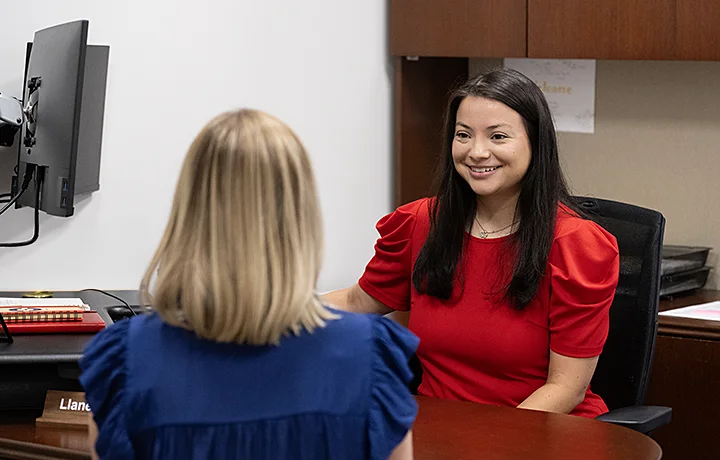
Academic Advising
Freshmen psychology majors, like most freshmen on campus, are advised through the Center for Student Success and First Year Experience (CSSFYE) except for students in the FASTrack program. Sophomores through seniors are advised by Academic Counselors in the CLA Office of Student Services along with mentorship by psychology faculty.
Advising for Freshmen Advising for Freshmen in FASTrack Advising for Sophomores, Junior, and Seniors -
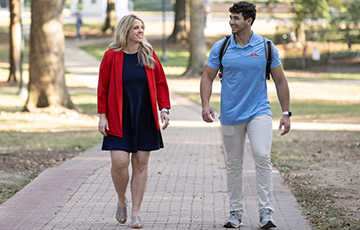
Health Professions Advising Office
Many psychology majors pursue a health professional career. HPAO's mission is to counsel all UM students who wish to pursue a health professional career. Students who utilize the services of HPAO have very high acceptance rates.
Health Professions Advising Office -

Pre-Law Advising Office
The UM Pre-Law Advising Office provides advising and support for the students, including psychology majors, who want to research and apply for law school. The office also helps students interested in the accelerated law program with the UM School of Law.
Pre-Law Advising Office -
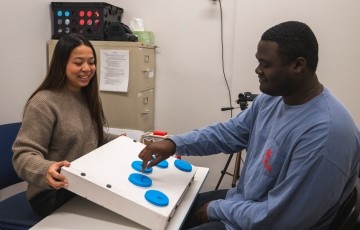
Psychology Class Students: Want to sign up for psychology experiments?
Create an account in Sona Systems then complete an intro questionnaire and a “Prescreening” study to earn 1 research hour. You will then gain access to all the available psychology research studies upon your next visit to the Sona Systems site. Questions may be directed to Dr. Andrew Hales.
Get Started with a Sona Systems Account Dr. Andrew Hales -
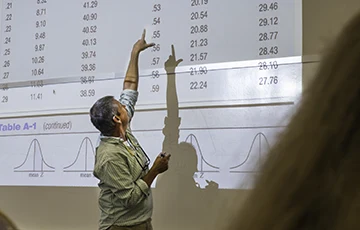
Looking ahead to graduate school?
Let us help you get there. Find out everything you need to know as an undergraduate to prepare for admission to psychology graduate school programs.
Preparation for Graduate School -

Careers and Alumni
What can psychology alumni can do after graduation? What should psychology majors be doing throughout their college career to identify and prepare for their post-graduation plans? Learn more about psychology careers and the advice of our department in preparing yourself for success. Meet some of our alumni.
Psychology Careers & Alumni
Degree Pathways
Let us help you map your interests in psychology to the appropriate classes and experiences.
Potential courses for those interested in the field of Addiction
Addiction psychology is a specialized area of psychology that focuses on understanding and treating addictive behaviors, which can involve substance use disorders or behavioral addictions. It examines the biological, psychological, and social factors that contribute to addiction, and develops interventions to improve health and well-being.
There are multiple potential pathways to prepare graduates to work in the field of addiction either after the undergraduate or graduate degree. Courses indicated with * are potentially relevant depending on career goals.
Take these courses as soon as possible:
- Psy 201: Introduction to Psychology
- Psy 202: Statistics for Behavioral Sciences
- Psy 205: Research Methods in Psychology
Highly recommended, take ASAP:
- Psy 301: Developmental Psychology
- Psy 309: Learning
- Psy 311: Abnormal Psychology
- Psy 319: Brain and Behavior*
- Psy 321: Social Psychology*
Recommended courses after completion of at least 3 courses from the list above and any prerequisites.
- Psy 313: Experimental Analysis of Behavior*
- Psy 322: Drugs and Behavior
- Psy 326: Sensation and Perception* (take Psy 319 & Psy 320 first)
- Psy 327: Psychology and Law
- Psy 401: Undergraduate Internship in Psychology*
- Psy 405: Minor Research Problems*
- Psy 410: Health Psychology*
- Psy 411: Memory
- Psy 415: Introduction to Clinical Psychology* (take Psy 311 first)
- Psy 420: Readings and Research in Psychology*
- Psy 425: Advanced Abnormal Behavioral Psych & Lit*
Additional courses to consider:
- Psy 303: Intermed. Statistical Methods for Psy
- Psy 308: Industrial Psychology
- Psy 315: Personality
- Psy 317: Tests and Measurements
- Psy 320: Cognitive Psychology
- Psy 323: Applied Behavior Analysis (take Psy 309 first)
- Psy 324: Science of Emotion
- Psy 340: Multicultural Psychology
- Psy 350: Ecopsychology and International Youth
- Psy 365: Environmental Psychology
- Psy 390: Lab in Psy: Behavioral Neuroscience
- Psy 392: Lab in Psy: Experimental Social Psy
- Psy 394: Lab in Psy: Cognition and Perception
- Psy 396: Laboratory in Psychology
- Psy 417: Disasters and Mental Health
- Psy 419: Psychology of Parenting (take Psy 309 first)
- Psy 430: Positive Psychology
- Psy 451: History and Systems of Psychology (great course for last semester or help prepare for the Psychology GRE)
- Psy 455: Special Topics in Psychology
- Psy 460: Psychology of Human Sexuality (take Psy 321 first)
- Psy 470: Children and Families: Community Work (take Psy 301 or Psy 419 first; taking both is beneficial)
- Psy 475: Topics in Psychology Abroad
- Psy 511: The Neural Basis of Learning & Memory
- Psy 565: Psychology of Gender
Potential courses for those interested in Behavior Analysis
Psychology majors may choose a Behavior Analysis emphasis, which aligns with the certification requirements for a Board Certified Assistant Behavior Analyst (BCaBA) equipping students with skills to engage in clinical practice in settings such as schools, centers, and communities. They work under the supervision of a Board Certified Behavior Analyst (BCBA).
These positions are intended to help protect vulnerable populations. Behavior analyst jobs include working with individuals with developmental disabilities such as autism, crime victims, brain injury patient skill development, behavior gerontology, behavioral sport psychology, substance use disorders, and behavior analysis in environmental sustainability.
An optional emphasis in behavior analysis consists of the following 21 hours of psychology courses:
- Psy 309: Learning
- Psy 313: Experimental Analysis of Behavior
- Psy 323: Applied Behavior Analysis
- Psy 328: Ethics in Behavioral Practice & Research
- Psy 423: Behaviorism: History & Theory
- Psy 408: Health Psychology or Psy 506:
- Psy 530: Single Subject & Small Group Research Design
Potential courses for those interested in Clinical Psychology Graduate School
"Clinical psychologists assess and treat mental, emotional and behavioral disorders. These range from short-term crises, such as difficulties resulting from adolescent conflicts, to more severe, chronic conditions, such as schizophrenia. Some clinical psychologists treat specific problems exclusively, such as phobias or clinical depression. Others focus on specific populations—for instance, youths; families, or couples; ethnic minority groups; gay, lesbian, bisexual and transgender individuals; or older people. They also consult with physicians on physical problems that have underlying psychological causes." APA website
There are multiple potential pathways to prepare you to apply to, get into, and succeed in a clinical psychology graduate program. Courses indicated with * are potentially relevant depending on career goals.
Take these courses as soon as possible:
- Psy 201: Introduction to Psychology
- Psy 202: Statistics for Behavioral Sciences (take with Psy 201 or the next semester)
- Psy 205: Research Methods in Psychology
Highly recommended, take ASAP:
- Psy 309: Learning
- Psy 301: Developmental Psychology
- Psy 311: Abnormal Psychology
- Psy 319: Brain and Behavior
- Psy 320: Cognitive Psychology
- Psy 321: Social Psychology
Recommended courses after completion of at least 3 courses from the list above and any prerequisites:
- Psy 303: Intermed. Statistical Methods for Psy*
- Psy 313: Experimental Analysis of Behavior*
- Psy 317: Tests and Measurements*
- Psy 315: Personality
- Psy 322: Drugs and Behavior
- Psy 323: Applied Behavior Analysis (take Psy 309 first)
- Psy 326: Sensation and Perception (take Psy 319 & Psy 320 first)
- Psy 327: Psychology and Law
- Psy 340: Multicultural Psychology*
- Psy 350: Ecopsychology and International Youth*
- Psy 390: Lab in Psy: Behavioral Neuroscience
- Psy 392: Lab in Psy: Experimental Social Psy*
- Psy 394: Lab in Psy: Cognition and Perception*
- Psy 396: Laboratory in Psychology*
- Psy 401: Undergraduate Internship in Psychology*
- Psy 405: Minor Research Problems*
- Psy 410: Health Psychology
- Psy 415: Introduction to Clinical Psychology (take Psy 311 first)
- Psy 417: Disasters and Mental Health
- Psy 419: Psychology of Parenting (take Psy 309 first)
- Psy 420: Readings and Research in Psychology*
- Psy 425: Advanced Abnormal Behavioral Psych & Lit*
- Psy 430: Positive Psychology
- Psy 451: History and Systems of Psychology (great course for last semester or preparation for the Psychology GRE.)
- Psy 455: Special Topics in Psychology*
- Psy 460: Psychology of Human Sexuality
- Psy 470: Children and Families: Community Work (take Psy 301 or Psy 419 first; taking both is even better)
- Psy 475: Topics in Psychology Abroad*
- Psy 511: The Neural Basis of Learning & Memory
- Psy 565: Psychology of Gender
Additional courses to consider:
- Psy 308: Industrial Psychology
- Psy 324: Science of Emotion
- Psy 365: Environmental Psychology
Potential courses for those interested in Cognitive Psychology
"Cognitive psychologists study human perception, thinking, and memory. They are interested in questions such as how the mind represents reality, how people learn, and how people understand and produce language. They also study reasoning, judgment and decision making." APA website
There are multiple potential pathways to prepare you to work in the field of Cognitive Psychology either following the undergraduate or graduate degree. Courses indicated with * are potentially relevant depending on career goals.
Take these courses as soon as possible:
- Psy 201: Introduction to Psychology
- Psy 202: Statistics for Behavioral Sciences (take with Psy 201 if possible)
- Psy 205: Research Methods in Psychology
Highly recommended, take ASAP:
- Psy 301: Developmental Psychology
- Psy 311: Abnormal Psychology
- Psy 319: Brain and Behavior
- Psy 320: Cognitive Psychology
- Psy 321: Social Psychology
Recommended courses after completion of at least 3 courses from the list above and any prerequisites:
- Psy 303: Intermed. Statistical Methods for Psy
- Psy 317: Tests and Measurements
- Psy 326: Sensation and Perception (take Psy 319 & Psy 320 first)
- Psy 327: Psychology and Law
- Psy 390: Lab in Psy: Behavioral Neuroscience
- Psy 392: Lab in Psy: Experimental Social Psy
- Psy 394: Lab in Psy: Cognition and Perception
- Psy 401: Undergraduate Internship in Psychology*
- Psy 405: Minor Research Problems*
- Psy 411: Memory
- Psy 420: Readings and Research in Psychology*
- Psy 451: History and Systems of Psychology
- Psy 511: The Neural Basis of Learning & Memory
Additional courses to consider:
- Psy 308: Industrial Psychology
- Psy 309: Learning
- Psy 313: Experimental Analysis of Behavior
- Psy 315: Personality
- Psy 322: Drugs and Behavior
- Psy 323: Applied Behavior Analysis (take Psy 309 first, but not required)
- Psy 324: Science of Emotion
- Psy 340: Multicultural Psychology
- Psy 350: Ecopsychology and International Youth
- Psy 365: Environmental Psychology
- Psy 396: Laboratory in Psychology
- Psy 410: Health Psychology
- Psy 415: Introduction to Clinical Psychology (take Psy 311 first)
- Psy 417: Disasters and Mental Health
- Psy 419: Psychology of Parenting (take Psy 309 first)
- Psy 425: Advanced Abnormal Behavioral Psych & Lit
- Psy 430: Positive Psychology
- Psy 451: History and Systems of Psychology (great course for last semester or to help prepare for the Psychology GRE.)
- Psy 455: Special Topics in Psychology
- Psy 460: Psychology of Human Sexuality (take Psy 321 first)
- Psy 470: Children and Families: Community Work (take Psy 301 or Psy 419 first; taking both is beneficial)
- Psy 455: Special Topics in Psychology
- Psy 460: Psychology of Human Sexuality
- Psy 470: Children and Families: Community Work
- Psy 475: Topics in Psychology Abroad
- Psy 565: Psychology of Gender
Potential courses for those interested in Community Psychology
"Community psychologists work to strengthen the abilities of communities, settings, organizations and broader social systems to meet people's needs. They help people access resources and collaborate with others to improve their lives and communities. Instead of helping individuals cope with negative circumstances (e.g., trauma, poverty), community psychologists help empower people to change those circumstances, prevent problems and develop stronger communities." APA website
There are multiple potential pathways to prepare you to work in the field of Community Psychology either following your undergraduate or a relevant graduate program. Courses indicated with * are potentially relevant depending on career goals.
Take these courses as soon as possible:
- Psy 201: Introduction to Psychology
- Psy 202: Statistics for Behavioral Sciences (take with Psy 201 if possible)
- Psy 205: Research Methods in Psychology
Highly recommended, take ASAP:
- Psy 301: Developmental Psychology
- Psy 309: Learning
- Psy 311: Abnormal Psychology
- Psy 320: Cognitive Psychology*
- Psy 321: Social Psychology
Recommended courses after completion of at least 3 courses from the list above and any prerequisites:
- Psy 315: Personality*
- Psy 317: Tests and Measurements*
- Psy 323: Applied Behavior Analysis* (take Psy 309 first)
- Psy 327: Psychology and Law
- Psy 340: Multicultural Psychology*
- Psy 350: Ecopsychology and International Youth*
- Psy 365: Environmental Psychology*
- Psy 401: Undergraduate Internship in Psychology*
- Psy 405: Minor Research Problems*
- Psy 417: Disasters and Mental Health
- Psy 419: Psychology of Parenting (take Psy 309 first)
- Psy 420: Readings and Research in Psychology*
- Psy 430: Positive Psychology
- Psy 451: History and Systems of Psychology (great course for last semester or preparation for the Psychology GRE)
- Psy 460: Psychology of Human Sexuality (take Psy 321 first)
- Psy 470: Children and Families: Community Work (take Psy 301 or Psy 419 first; taking both is beneficial)
Additional courses to consider:
- Psy 303: Intermed. Statistical Methods for Psy
- Psy 308: Industrial Psychology
- Psy 313: Experimental Analysis of Behavior
- Psy 319: Brain and Behavior
- Psy 322: Drugs and Behavior
- Psy 324: Science of Emotion
- Psy 326: Sensation and Perception (take Psy 319 & Psy 320 first)
- Psy 390: Lab in Psy: Behavioral Neuroscience
- Psy 392: Lab in Psy: Experimental Social Psy
- Psy 394: Lab in Psy: Cognition and Perception
- Psy 396: Laboratory in Psychology
- Psy 410: Health Psychology
- Psy 415: Introduction to Clinical Psychology
- Psy 425: Advanced Abnormal Behavioral Psych & Lit
- Psy 455: Special Topics in Psychology
- Psy 475: Topics in Psychology Abroad
- Psy 511: The Neural Basis of Learning & Memory
- Psy 565: Psychology of Gender
Potential courses for those interested in Counseling Psychology or Counseling
"Counseling psychologists help people recognize their strengths and resources to cope with everyday problems and serious adversity. They do counseling/psychotherapy, teaching and scientific research with individuals of all ages, families and organizations (e.g., schools, hospitals, businesses). Counseling psychologists help people understand and take action on career and work problems, they pay attention to how problems and people differ across the lifespan, and they have great respect for the influence of differences among people (such as race, gender, sexual orientation, religion, disability status) on psychological well-being." APA website
There are multiple potential pathways to prepare you to work in the field of Counseling Psychology or Counseling either following the undergraduate or graduate degrees. Courses indicated with * are potentially relevant depending on career goals.
Take these courses as soon as possible:
- Psy 201: Introduction to Psychology
- Psy 202: Statistics for Behavioral Sciences (take with Psy 201 if possible)
- Psy 205: Research Methods in Psychology
Highly recommended, take ASAP:
- Psy 301: Developmental Psychology
- Psy 309: Learning
- Psy 311: Abnormal Psychology
- Psy 320: Cognitive Psychology*
- Psy 321: Social Psychology*
Recommended courses after completion of at least 3 courses from the list above and any prerequisites:
- Psy 313: Experimental Analysis of Behavior
- Psy 315: Personality
- Psy 317: Tests and Measurements
- Psy 322: Drugs and Behavior
- Psy 323: Applied Behavior Analysis (take Psy 309 first)
- Psy 324: Science of Emotion
- Psy 340: Multicultural Psychology
- Psy 392: Lab in Psy: Experimental Social Psy
- Psy 401: Undergraduate Internship in Psychology
- Psy 405: Minor Research Problems
- Psy 410: Health Psychology
- Psy 415: Introduction to Clinical Psychology (take Psy 311 first)
- Psy 417: Disasters and Mental Health
- Psy 419: Psychology of Parenting (take Psy 309 first)
- Psy 420: Readings and Research in Psychology
- Psy 430: Positive Psychology
- Psy 451: History and Systems of Psychology (great course for last semester or preparation for the Psychology GRE.)
- Psy 460: Psychology of Human Sexuality (take Psy 321 first)
- Psy 470: Children and Families: Community Work (take Psy 301 or Psy 419 first; taking both is beneficial)
- Psy 565: Psychology of Gender
Additional courses to consider:
- Psy 303: Intermed. Statistical Methods for Psy
- Psy 308: Industrial Psychology
- Psy 319: Brain and Behavior
- Psy 326: Sensation and Perception (take Psy 319 & Psy 320 first)
- Psy 327: Psychology and Law
- Psy 350: Ecopsychology and International Youth
- Psy 365: Environmental Psychology
- Psy 390: Lab in Psy: Behavioral Neuroscience
- Psy 394: Lab in Psy: Cognition and Perception
- Psy 396: Laboratory in Psychology
- Psy 425: Advanced Abnormal Behavioral Psych & Lit
- Psy 455: Special Topics in Psychology
- Psy 475: Topics in Psychology Abroad
- Psy 511: The Neural Basis of Learning & Memory
Potential courses for those interested in Criminal Justice or Forensic Psychology
"Forensic psychologists apply psychological principles to legal issues. Their expertise is often essential within the judicial system. They can, for example, help a judge decide which parent should have custody of a child or evaluate a defendant's mental competence to stand trial. Forensic psychologists also conduct research on jury behavior or eyewitness testimony. Some forensic psychologists are trained in both psychology and the law." APA website
There are multiple potential pathways to prepare you to work within the fields of Criminal Justice or Forensics either following undergraduate or graduate degrees. Courses indicated with * are potentially relevant depending on career goals.
Take these courses as soon as possible:
- Psy 201: Introduction to Psychology
- Psy 202: Statistics for Behavioral Sciences (take with Psy 201 if possible)
- Psy 205: Research Methods in Psychology
Highly recommended, take ASAP:
- Psy 301: Developmental Psychology
- Psy 309: Learning
- Psy 311: Abnormal Psychology
- Psy 319: Brain and Behavior*
- Psy 320: Cognitive Psychology*
Recommended courses after completion of at least 3 courses from the list above and any prerequisites:
- Psy 313: Experimental Analysis of Behavior*
- Psy 315: Personality*
- Psy 322: Drugs and Behavior*
- Psy 327: Psychology and Law*
- Psy 340: Multicultural Psychology*
- Psy 401: Undergraduate Internship in Psychology*
- Psy 405: Minor Research Problems*
- Psy 410: Health Psychology
- Psy 417: Disasters and Mental Health
- Psy 419: Psychology of Parenting (take Psy 309 first)
- Psy 420: Readings and Research in Psychology Psy 460: Psychology of Human Sexuality (take Psy 321 firs)
Additional courses to consider:
- Psy 303: Intermed. Statistical Methods for Psy
- Psy 308: Industrial Psychology
- Psy 317: Tests and Measurements
- Psy 321: Social Psychology
- Psy 323: Applied Behavior Analysis
- Psy 324: Science of Emotion
- Psy 326: Sensation and Perception (take Psy 319 & Psy 320 first)
- Psy 350: Ecopsychology and International Youth
- Psy 365: Environmental Psychology
- Psy 390: Lab in Psy: Behavioral Neuroscience
- Psy 392: Lab in Psy: Experimental Social Psy
- Psy 394: Lab in Psy: Cognition and Perception
- Psy 396: Laboratory in Psychology
- Psy 415: Introduction to Clinical Psychology (take Psy 311 first)
- Psy 425: Advanced Abnormal Behavioral Psych & Lit
- Psy 430: Positive Psychology
- Psy 451: History and Systems of Psychology (great course for last semester or preparation for the Psychology GRE)
- Psy 455: Special Topics in Psychology
- Psy 470: Children and Families: Community Work (take Psy 301 or Psy 419 first; taking both is beneficial)
- Psy 475: Topics in Psychology Abroad
- Psy 511: The Neural Basis of Learning & Memory
- Psy 565: Psychology of Gender
Potential courses for those interested in Developmental Psychology
"Developmental psychologists study the psychological development of the human being that takes place throughout life. Until recently, the primary focus was on childhood and adolescence, the most formative years. But as life expectancy in this country approaches 80 years, developmental psychologists are becoming increasingly interested in aging, especially in researching and developing ways to help older people stay as independent as possible." APA website
There are multiple potential pathways to prepare you to work in the field of Developmental Psychology either following undergraduate or graduate degrees. Courses indicated with * are potentially relevant depending on career goals.
Take these courses as soon as possible:
- Psy 201: Introduction to Psychology
- Psy 202: Statistics for Behavioral Sciences (take with Psy 201 if possible)
- Psy 205: Research Methods in Psychology
Highly recommended, take ASAP:
- Psy 301: Developmental Psychology
- Psy 309: Learning
- Psy 311: Abnormal Psychology
- Psy 315: Personality
- Psy 320: Cognitive Psychology
- Psy 321: Social Psychology
Recommended courses after completion of at least 3 courses from the list above and any prerequisites:
- Psy 303: Intermed. Statistical Methods for Psy*
- Psy 313: Experimental Analysis of Behavior*
- Psy 317: Tests and Measurements*
- Psy 319: Brain and Behavior*
- Psy 322: Drugs and Behavior*
- Psy 323: Applied Behavior Analysis* (take Psy 309 first)
- Psy 324: Science of Emotion*
- Psy 326: Sensation and Perception (take Psy 319 & Psy 320 first)
- Psy 327: Psychology and Law
- Psy 340: Multicultural Psychology*
- Psy 350: Ecopsychology and International Youth*
- Psy 392: Lab in Psy: Experimental Social Psy
- Psy 394: Lab in Psy: Cognition and Perception*
- Psy 401: Undergraduate Internship in Psychology*
- Psy 405: Minor Research Problems*
- Psy 410: Health Psychology*
- Psy 415: Introduction to Clinical Psychology (take Psy 311 first)
- Psy 417: Disasters and Mental Health*
- Psy 419: Psychology of Parenting (take Psy 309 first)
- Psy 420: Readings and Research in Psychology*
- Psy 430: Positive Psychology*
- Psy 451: History and Systems of Psychology (great course for last semester or preparation for the Psychology GRE.)
- Psy 460: Psychology of Human Sexuality (take Psy 321 first)
- Psy 470: Children and Families: Community Work (take Psy 301 or Psy 419; taking both is beneficial)
- Psy 511: The Neural Basis of Learning & Memory*
Additional courses to consider:
- Psy 308: Industrial Psychology
- Psy 365: Environmental Psychology
- Psy 390: Lab in Psy: Behavioral Neuroscience
- Psy 396: Laboratory in Psychology
- Psy 425: Advanced Abnormal Behavioral Psych & Lit
- Psy 455: Special Topics in Psychology
- Psy 475: Topics in Psychology Abroad
- Psy 565: Psychology of Gender
Potential courses for those interested in Environmental Psychology
"Environmental psychologists study the dynamics of person–environment interactions. Environmental psychologists explore such issues as common property resource management, the effect of environmental stress on human effectiveness and well-being, the characteristics of restorative environments and human information processing. They also foster conservation behavior, helping people to craft durable behavioral responses to emerging biophysical limits." APA website
There are multiple potential pathways to prepare you to work in the field of Environmental Psychology either following undergraduate or graduate degree. Courses indicated with * are potentially relevant depending on career goals.
Take these courses as soon as possible:
- Psy 201: Introduction to Psychology
- Psy 202: Statistics for Behavioral Sciences (take with Psy 201 if possible)
- Psy 205: Research Methods in Psychology
Highly recommended, take ASAP:
- Psy 301: Developmental Psychology
- Psy 309: Learning
- Psy 311: Abnormal Psychology
- Psy 315: Personality
- Psy 320: Cognitive Psychology
- Psy 321: Social Psychology
Recommended courses after completion of at least 3 courses from the list above and any prerequisites:
- Psy 323: Applied Behavior Analysis (take Psy 309 first)
- Psy 326: Sensation and Perception (take Psy 319 & Psy 320 first)
- Psy 350: Ecopsychology and International Youth*
- Psy 365: Environmental Psychology
- Psy 392: Lab in Psy: Experimental Social Psy
- Psy 401: Undergraduate Internship in Psychology*
- Psy 405: Minor Research Problems*
- Psy 417: Disasters and Mental Health
- Psy 420: Readings and Research in Psychology*
- Psy 430: Positive Psychology
- Psy 451: History and Systems of Psychology (great course during last semester or to prepare for the Psychology GRE)
- Psy 475: Topics in Psychology Abroad*
Additional courses to consider:
- Psy 303: Intermed. Statistical Methods for Psy
- Psy 308: Industrial Psychology
- Psy 313: Experimental Analysis of Behavior
- Psy 315: Personality
- Psy 317: Tests and Measurements
- Psy 319: Brain and Behavior
- Psy 322: Drugs and Behavior
- Psy 324: Science of Emotion
- Psy 327: Psychology and Law
- Psy 340: Multicultural Psychology
- Psy 390: Lab in Psy: Behavioral Neuroscience
- Psy 394: Lab in Psy: Cognition and Perception
- Psy 396: Laboratory in Psychology
- Psy 410: Health Psychology
- Psy 415: Introduction to Clinical Psychology (take Psy 311 first)
- Psy 419: Psychology of Parenting (take Psy 309 first)
- Psy 425: Advanced Abnormal Behavioral Psych & Lit
- Psy 455: Special Topics in Psychology
- Psy 460: Psychology of Human Sexuality (take Psy 321 first)
- Psy 470: Children and Families: Community Work (take Psy 301 or Psy 419 first; taking both is beneficial)
- Psy 511: The Neural Basis of Learning & Memory
- Psy 565: Psychology of Gender
Potential courses for those interested in Health Psychology
"Health psychologists specialize in how biological, psychological and social factors affect health and illness. They study how patients handle illness, why some people don’t follow medical advice and the most effective ways to control pain or change poor health habits. They also develop health care strategies that foster emotional and physical well-being." APA website
There are multiple potential pathways to prepare you to work in the field of Health Psychology either following earning undergraduate or graduate degrees. Courses indicated with * are potentially relevant depending on career goals.
Take these courses as soon as possible:
- Psy 201: Introduction to Psychology
- Psy 202: Statistics for Behavioral Sciences (take with Psy 201 if possible)
- Psy 205: Research Methods in Psychology
Highly recommended, take ASAP:
- Psy 301: Developmental Psychology
- Psy 309: Learning
- Psy 311: Abnormal Psychology
- Psy 319: Brain and Behavior
- Psy 320: Cognitive Psychology
- Psy 321: Social Psychology
Recommended courses after completion of at least 3 courses from the list above and any prerequisites:
- Psy 322: Drugs and Behavior
- Psy 303: Intermed. Statistical Methods for Psy*
- Psy 313: Experimental Analysis of Behavior*
- Psy 315: Personality*
- Psy 317: Tests and Measurements*
- Psy 323: Applied Behavior Analysis (take Psy 309 first)
- Psy 326: Sensation and Perception (take Psy 319 & Psy 320 first)
- Psy 340: Multicultural Psychology*
- Psy 390: Lab in Psy: Behavioral Neuroscience
- Psy 392: Lab in Psy: Experimental Social Psy
- Psy 401: Undergraduate Internship in Psychology*
- Psy 405: Minor Research Problems*
- Psy 410: Health Psychology
- Psy 415: Introduction to Clinical Psychology (take Psy 311 first)
- Psy 417: Disasters and Mental Health
- Psy 420: Readings and Research in Psychology*
- Psy 425: Advanced Abnormal Behavioral Psych & Lit*
- Psy 430: Positive Psychology*
- Psy 451: History and Systems of Psychology (great course for last semester or preparation for the Psychology GRE)
- Psy 460: Psychology of Human Sexuality (take Psy 321 first)
- Psy 511: The Neural Basis of Learning & Memory*
- Psy 565: Psychology of Gender*
Additional courses to consider:
- Psy 308: Industrial Psychology
- Psy 324: Science of Emotion
- Psy 327: Psychology and Law
- Psy 350: Ecopsychology and International Youth
- Psy 365: Environmental Psychology
- Psy 394: Lab in Psy: Cognition and Perception
- Psy 396: Laboratory in Psychology
- Psy 419: Psychology of Parenting (take Psy 309 first)
- Psy 455: Special Topics in Psychology
- Psy 470: Children and Families: Community Work (take Psy 301 or Psy 419 first; taking both is beneficial)
- Psy 475: Topics in Psychology Abroad
Potential courses for those interested in a Health Profession
There are multiple potential pathways to prepare you to work in the Health Profession field. Students consult with the Health Professions Advising Office (HPAO) for the required and recommended courses for admission to medical school, dental school, and more.
Psychology courses listed below are relevant, with those indicated with * are potentially relevant depending on career goals.
Take these courses as soon as possible:
- Psy 201: Introduction to Psychology
- Psy 202: Statistics for Behavioral Sciences (take with Psy 201 if possible)
- Psy 205: Research Methods in Psychology
Highly recommended, take ASAP:
- Psy 301: Developmental Psychology
- Psy 309: Learning
- Psy 311: Abnormal Psychology
- Psy 319: Brain and Behavior
- Psy 320: Cognitive Psychology
- Psy 321: Social Psychology
Recommended courses after completion of at least 3 courses from the list above and any prerequisites:
- Psy 322: Drugs and Behavior
- Psy 323: Applied Behavior Analysis (take Psy 309 first)
- Psy 326: Sensation and Perception (take Psy 319 & Psy 320 first)
- Psy 340: Multicultural Psychology*
- Psy 390: Lab in Psy: Behavioral Neuroscience
- Psy 401: Undergraduate Internship in Psychology
- Psy 405: Minor Research Problems*
- Psy 410: Health Psychology
- Psy 415: Introduction to Clinical Psychology (take Psy 311 first)
- Psy 419: Psychology of Parenting (take Psy 309 first)
- Psy 430: Positive Psychology*
- Psy 460: Psychology of Human Sexuality* (take Psy 321 first)
- Psy 511: The Neural Basis of Learning & Memory
- Psy 565: Psychology of Gender*
Additional courses to consider:
- Psy 303: Intermed. Statistical Methods for Psy
- Psy 308: Industrial Psychology
- Psy 313: Experimental Analysis of Behavior
- Psy 315: Personality
- Psy 317: Tests and Measurements
- Psy 324: Science of Emotion
- Psy 327: Psychology and Law
- Psy 350: Ecopsychology and International Youth
- Psy 365: Environmental Psychology
- Psy 392: Lab in Psy: Experimental Social Psy
- Psy 394: Lab in Psy: Cognition and Perception
- Psy 396: Laboratory in Psychology
- Psy 417: Disasters and Mental Health
- Psy 420: Readings and Research in Psychology
- Psy 425: Advanced Abnormal Behavioral Psych & Lit
- Psy 451: History and Systems of Psychology (great course for last semester or preparation for the Psychology GRE)
- Psy 455: Special Topics in Psychology
- Psy 470: Children and Families: Community Work (take Psy 301 or Psy 419; taking both is beneficial)
- Psy 475: Topics in Psychology Abroad
Potential courses for those interested in Industrial/Organizational Psychology
"Industrial/organizational (I/O) psychologists apply psychological principles and research methods to the workplace in the interest of improving productivity, health and the quality of work life. Many serve as human resources specialists, helping organizations with staffing, training and employee development. They may provide employers with testing and other valid selection procedures in their hiring and promotion processes. Others work as management consultants in such areas as strategic planning, quality management and coping with organizational change." APA website
There are multiple potential pathways to prepare you to work in the Industrial/Organizational field either following undergraduate or graduate degree. Courses indicated with * are potentially relevant depending on career goals.
Take these courses as soon as possible:
- Psy 201: Introduction to Psychology
- Psy 202: Statistics for Behavioral Sciences (take with Psy 201 if possible)
- Psy 205: Research Methods in Psychology
Highly recommended, take ASAP:
- Psy 301: Developmental Psychology
- Psy 308: Industrial Psychology
- Psy 309: Learning
- Psy 311: Abnormal Psychology
- Psy 320: Cognitive Psychology
- Psy 321: Social Psychology
Recommended courses after completion of at least 3 courses from the list above and any prerequisites:
- Psy 303: Intermed. Statistical Methods for Psy*
- Psy 313: Experimental Analysis of Behavior*
- Psy 315: Personality*
- Psy 317: Tests and Measurements*
- Psy 323: Applied Behavior Analysis (take Psy 309 first)
- Psy 327: Psychology and Law*
- Psy 340: Multicultural Psychology*
- Psy 392: Lab in Psy: Experimental Social Psy*
- Psy 401: Undergraduate Internship in Psychology*
- Psy 405: Minor Research Problems*
- Psy 420: Readings and Research in Psychology*
- Psy 430: Positive Psychology*
- Psy 451: History and Systems of Psychology (great course for last semester or preparation for the Psychology GRE.)
- Psy 565: Psychology of Gender*
Additional courses to consider:
- Psy 319: Brain and Behavior
- Psy 322: Drugs and Behavior
- Psy 324: Science of Emotion
- Psy 326: Sensation and Perception (take Psy 319 & Psy 320 first)
- Psy 350: Ecopsychology and International Youth
- Psy 365: Environmental Psychology
- Psy 390: Lab in Psy: Behavioral Neuroscience
- Psy 394: Lab in Psy: Cognition and Perception
- Psy 396: Laboratory in Psychology
- Psy 410: Health Psychology
- Psy 415: Introduction to Clinical Psychology (take Psy 311 first)
- Psy 417: Disasters and Mental Health
- Psy 419: Psychology of Parenting (take Psy 309 first)
- Psy 425: Advanced Abnormal Behavioral Psych & Lit
- Psy 455: Special Topics in Psychology
- Psy 460: Psychology of Human Sexuality (take Psy 321 first)
- Psy 470: Children and Families: Community Work (take Psy 301 or Psy 419 first; taking both is beneficial)
- Psy 475: Topics in Psychology Abroad
- Psy 511: The Neural Basis of Learning & Memory
Potential courses for those interested in Law School
There are multiple potential pathways to prepare you to apply to, get into, and succeed in law school. Students should connect with the Pre-Law Advising Office for assistance. Courses indicated with * are potentially relevant depending on career goals.
These courses as soon as possible:
- Psy 201: Introduction to Psychology
- Psy 202: Statistics for Behavioral Sciences (take with Psy 201 if possible)
- Psy 205: Research Methods in Psychology
Highly recommended, take ASAP:
- Psy 301: Developmental Psychology
- Psy 308: Industrial Psychology
- Psy 309: Learning
- Psy 311: Abnormal Psychology
- Psy 320: Cognitive Psychology
- Psy 321: Social Psychology
Recommended courses after completion of at least 3 courses from the list above and any prerequisites:
- Psy 303: Intermed. Statistical Methods for Psy*
- Psy 313: Experimental Analysis of Behavior*
- Psy 315: Personality*
- Psy 317: Tests and Measurements*
- Psy 323: Applied Behavior Analysis (take Psy 309 first)
- Psy 327: Psychology and Law*
- Psy 340: Multicultural Psychology*
- Psy 392: Lab in Psy: Experimental Social Psy*
- Psy 401: Undergraduate Internship in Psychology*
- Psy 405: Minor Research Problems*
- Psy 420: Readings and Research in Psychology*
- Psy 430: Positive Psychology*
- Psy 451: History and Systems of Psychology (great course for last semester or preparation for the Psychology GRE)
- Psy 565: Psychology of Gender*
Additional courses to consider:
- Psy 319: Brain and Behavior
- Psy 322: Drugs and Behavior
- Psy 324: Science of Emotion
- Psy 326: Sensation and Perception (take Psy 319 & Psy 320 first)
- Psy 350: Ecopsychology and International Youth
- Psy 365: Environmental Psychology
- Psy 390: Lab in Psy: Behavioral Neuroscience
- Psy 394: Lab in Psy: Cognition and Perception
- Psy 396: Laboratory in Psychology
- Psy 410: Health Psychology
- Psy 415: Introduction to Clinical Psychology (take Psy 311 first)
- Psy 417: Disasters and Mental Health
- Psy 419: Psychology of Parenting (take Psy 309 first)
- Psy 425: Advanced Abnormal Behavioral Psych & Lit
- Psy 455: Special Topics in Psychology
- Psy 460: Psychology of Human Sexuality (take Psy 321 first)
- Psy 470: Children and Families: Community Work (take Psy 301 or Psy 419 first; taking both is beneficial)
- Psy 475: Topics in Psychology Abroad
- Psy 511: The Neural Basis of Learning & Memory
Potential courses for those interested in Neurological/Biological Psychology
"Neuropsychologists (and behavioral neuropsychologists) explore the relationships between brain systems and behavior. For example, behavioral neuropsychologists may study the way the brain creates and stores memories, or how various diseases and injuries of the brain affect emotion, perception and behavior. They design tasks to study normal brain functions with imaging techniques such as positron emission tomography (PET), single photon emission computed tomography (SPECT) and functional magnetic resonance imaging (fMRI)." APA website
There are multiple potential pathways to prepare you to work in the field of Neurological Psychology. Courses indicated with * are potentially relevant depending on career goals.
Take these courses as soon as possible:
- Psy 201: Introduction to Psychology
- Psy 202: Statistics for Behavioral Sciences (take with Psy 201 if possible)
- Psy 205: Research Methods in Psychology
Highly recommended, take ASAP:
- Psy 301: Developmental Psychology
- Psy 311: Abnormal Psychology
- Psy 319: Brain and Behavior
- Psy 320: Cognitive Psychology
Recommended courses after completion of at least 3 courses from the list above and any prerequisites:
- Psy 303: Intermed. Statistical Methods for Psy
- Psy 322: Drugs and Behavior
- Psy 326: Sensation and Perception (take Psy 319 & Psy 320 first)
- Psy 390: Lab in Psy: Behavioral Neuroscience
- Psy 401: Undergraduate Internship in Psychology*
- Psy 405: Minor Research Problems*
- Psy 410: Health Psychology*
- Psy 420: Readings and Research in Psychology*
- Psy 451: History and Systems of Psychology (great course for last semester or prepare for the Psychology GRE)
- Psy 511: The Neural Basis of Learning & Memory
Additional courses to consider:
- Psy 308: Industrial Psychology
- Psy 309: Learning
- Psy 313: Experimental Analysis of Behavior
- Psy 315: Personality
- Psy 317: Tests and Measurements
- Psy 321: Social Psychology
- Psy 323: Applied Behavior Analysis (take Psy 309 first)
- Psy 324: Science of Emotion
- Psy 327: Psychology and Law
- Psy 340: Multicultural Psychology
- Psy 350: Ecopsychology and International Youth
- Psy 365: Environmental Psychology
- Psy 392: Lab in Psychology: Experimental Social Psychology
- Psy 394: Lab in Psychology: Cognition and Perception
- Psy 396: Laboratory in Psychology
- Psy 415: Introduction to Clinical Psychology (take Psy 311 first)
- Psy 417: Disasters and Mental Health
- Psy 419: Psychology of Parenting (take Psy 309 first)
- Psy 425: Advanced Abnormal Behavioral Psychology & Literature
- Psy 430: Positive Psychology
- Psy 455: Special Topics in Psychology
- Psy 460: Psychology of Human Sexuality (take Psy 321 first)
- Psy 470: Children and Families: Community Work (take Psy 301 or Psy 419; taking both is beneficial)
- Psy 475: Topics in Psychology Abroad
- Psy 565: Psychology of Gender
Potential courses for those interested in Positive Psychology
Positive psychology is a branch of psychology that focuses on the positive aspects of human experience, including well-being, happiness, and flourishing, rather than solely on mental illness and dysfunction. It seeks to understand and promote the conditions that contribute to positive psychological states, positive relationships, and positive institutions. In essence, it's the scientific study of what makes life worth living and how to enhance the human experience.
There are multiple potential pathways to prepare you to work in the field of Positive Psychology either following earning the undergraduate or graduate degree. Courses indicated with * are potentially relevant depending on career goals.
Take these courses as soon as possible:
- Psy 201: Introduction to Psychology
- Psy 202: Statistics for Behavioral Sciences (take with Psy 201 if possible)
- Psy 205: Research Methods in Psychology
Highly recommended, take ASAP:
- Psy 301: Developmental Psychology
- Psy 311: Abnormal Psychology
- Psy 321: Social Psychology
Recommended courses after completion of at least 3 courses from the list above and any prerequisites:
- Psy 315: Personality
- Psy 392: Lab in Psy: Experimental Social Psy
- Psy 401: Undergraduate Internship in Psychology*
- Psy 405: Minor Research Problems*
- Psy 410: Health Psychology*
- Psy 417: Disasters and Mental Health
- Psy 419: Psychology of Parenting (take Psy 309 first)
- Psy 420: Readings and Research in Psychology*
- Psy 430: Positive Psychology
- Psy 327: Psychology and Law
- Psy 451: History and Systems of Psychology (great course for last semester or to prepare for Psychology GRE)
- Psy 460: Psychology of Human Sexuality (take Psy 321 first)
- Psy 470: Children and Families: Community Work (take Psy 301 or Psy 419 first; taking both is beneficial)
- Psy 565: Psychology of Gender*
Additional courses to consider:
- Psy 303: Intermediate Statistical Methods for Psychology
- Psy 308: Industrial Psychology
- Psy 309: Learning
- Psy 313: Experimental Analysis of Behavior
- Psy 317: Tests and Measurements
- Psy 319: Brain and Behavior
- Psy 320: Cognitive Psychology
- Psy 322: Drugs and Behavior
- Psy 323: Applied Behavior Analysis (take Psy 309 first)
- Psy 324: Science of Emotion
- Psy 326: Sensation and Perception (take Psy 319 & Psy 320 first)
- Psy 340: Multicultural Psychology
- Psy 350: Ecopsychology and International Youth
- Psy 365: Environmental Psychology
- Psy 390: Lab in Psychology: Behavioral Neuroscience
- Psy 394: Lab in Psychology: Cognition and Perception
- Psy 396: Laboratory in Psychology
- Psy 415: Introduction to Clinical Psychology (take Psy 311 first)
- Psy 425: Advanced Abnormal Behavioral Psych & Lit
- Psy 455: Special Topics in Psychology
- Psy 475: Topics in Psychology Abroad
- Psy 511: The Neural Basis of Learning & Memory
Potential courses for those interested in School Psychology
"School psychologists are engaged in the delivery of comprehensive psychological services to children, adolescents and families in schools and other applied settings. They assess and counsel students, consult with parents and school staff, and conduct behavioral interventions when appropriate. Most school districts employ psychologists full time." APA website
There are multiple potential pathways to prepare you to work in the field of School Psychology either following the undergraduate or graduate degree. Courses indicated with * are potentially relevant depending on career goals.
Take these courses as soon as possible:
- Psy 201: Introduction to Psychology
- Psy 202: Statistics for Behavioral Sciences (take with Psy 201 if possible)
- Psy 205: Research Methods in Psychology
Highly recommended, take ASAP:
- Psy 301: Developmental Psychology
- Psy 309: Learning
- Psy 311: Abnormal Psychology
- Psy 320: Cognitive Psychology
- Psy 321: Social Psychology*
Recommended courses after completion of at least 3 courses from the list above and any prerequisites:
- Psy 303: Intermed. Statistical Methods for Psychology*
- Psy 313: Experimental Analysis of Behavior*
- Psy 315: Personality*
- Psy 317: Tests and Measurements*
- Psy 323: Applied Behavior Analysis (take Psy 309 first)
- Psy 327: Psychology and Law
- Psy 340: Multicultural Psychology*
- Psy 401: Undergraduate Internship in Psychology*
- Psy 405: Minor Research Problems*
- Psy 415: Introduction to Clinical Psychology (take Psy 311 first)
- Psy 417: Disasters and Mental Health
- Psy 419: Psychology of Parenting (take Psy 309 first)
- Psy 420: Readings and Research in Psychology*
- Psy 430: Positive Psychology
- Psy 451: History and Systems of Psychology (great course for last semester or to prepare for the Psychology GRE)
- Psy 470: Children and Families: Community Work (take Psy 301 or Psy 419 first; taking both is beneficial.)
- Psy 565: Psychology of Gender*
Additional courses to consider:
- Psy 308: Industrial Psychology
- Psy 319: Brain and Behavior
- Psy 322: Drugs and Behavior
- Psy 324: Science of Emotion
- Psy 326: Sensation and Perception (take Psy 319 & Psy 320 first)
- Psy 350: Ecopsychology and International Youth
- Psy 365: Environmental Psychology
- Psy 390: Lab in Psychology: Behavioral Neuroscience
- Psy 392: Lab in Psychology: Experimental Social Psychology
- Psy 394: Lab in Psychology: Cognition and Perception
- Psy 396: Laboratory in Psychology
- Psy 410: Health Psychology
- Psy 425: Advanced Abnormal Behavioral Psychology & Literature
- Psy 455: Special Topics in Psychology
- Psy 460: Psychology of Human Sexuality (take Psy 321 first)
- Psy 475: Topics in Psychology Abroad
- Psy 511: The Neural Basis of Learning & Memory
Potential courses for those interested in Social Psychology
"Social psychologists study how a person’s mental life and behavior are shaped by interactions with other people. They are interested in all aspects of interpersonal relationships, including both individual and group influences, and seek ways to improve such interactions. For example, their research helps us understand how people form attitudes toward others and, when these are harmful — as in the case of prejudice — provides insight into ways to change them." APA Website
There are multiple potential pathways to prepare you to work in the field of Social Psychology either following your undergraduate or graduate degree. Courses indicated with * are potentially relevant depending on career goals.
Take these courses as soon as possible:
- Psy 201: Introduction to Psychology
- Psy 202: Statistics for Behavioral Sciences (take with Psy 201 if possible)
- Psy 205: Research Methods in Psychology
Highly recommended, take ASAP:
- Psy 301: Developmental Psychology
- Psy 309: Learning
- Psy 311: Abnormal Psychology
- Psy 319: Brain and Behavior
- Psy 320: Cognitive Psychology
- Psy 321: Social Psychology
Recommended courses after completion of at least 3 courses from the list above and any prerequisites:
- Psy 303: Intermed. Statistical Methods for Psychology*
- Psy 315: Personality
- Psy 324: Science of Emotion
- Psy 327: Psychology and Law
- Psy 340: Multicultural Psychology*
- Psy 392: Lab in Psy: Experimental Social Psy
- Psy 401: Undergraduate Internship in Psychology*
- Psy 405: Minor Research Problems*
- Psy 417: Disasters and Mental Health
- Psy 420: Readings and Research in Psychology*
- Psy 430: Positive Psychology
- Psy 451: History and Systems of Psychology (great course for last semester or prepare for the Psychology GRE)
- Psy 460: Psychology of Human Sexuality (take Psy 321 first)
- Psy 565: Psychology of Gender
Additional courses to consider:
- Psy 308: Industrial Psychology
- Psy 313: Experimental Analysis of Behavior
- Psy 317: Tests and Measurements
- Psy 322: Drugs and Behavior
- Psy 323: Applied Behavior Analysis (take Psy 309 first)
- Psy 326: Sensation and Perception (take Psy 319 & Psy 320 first)
- Psy 350: Ecopsychology and International Youth
- Psy 365: Environmental Psychology
- Psy 390: Lab in Psychology: Behavioral Neuroscience
- Psy 394: Lab in Psychology: Cognition and Perception
- Psy 396: Laboratory in Psychology
- Psy 410: Health Psychology
- Psy 415: Introduction to Clinical Psychology (take Psy 311 first)
- Psy 419: Psychology of Parenting (take Psy 309 first)
- Psy 425: Advanced Abnormal Behavioral Psychology & Literature
- Psy 455: Special Topics in Psychology
- Psy 470: Children and Families: Community Work (take Psy 301 or Psy 419 first; taking both is beneficial)
- Psy 475: Topics in Psychology Abroad
- Psy 511: The Neural Basis of Learning & Memory
Potential courses for those interested in Sports Psychology
"Sport psychologists help athletes refine their focus on competition goals, become more motivated, and learn to deal with the anxiety and fear of failure that often accompany competition. The field is growing as sports of all kinds become more competitive and attract younger children." APA Website
There are multiple potential pathways to prepare you to work in the field of Sports Psychology either following undergraduate and graduate degree. Courses indicated with * are potentially relevant depending on career goals.
Take these courses as soon as possible:
- Psy 201: Introduction to Psychology
- Psy 202: Statistics for Behavioral Sciences (take with Psy 201 if possible)
- Psy 205: Research Methods in Psychology
Highly recommended, take ASAP:
- Psy 301: Developmental Psychology
- Psy 309: Learning
- Psy 311: Abnormal Psychology
- Psy 319: Brain and Behavior*
- Psy 321: Social Psychology
Recommended courses after completion of at least 3 courses from the list above and any prerequisites:
- Psy 313: Experimental Analysis of Behavior*
- Psy 315: Personality*
- Psy 317: Tests and Measurements*
- Psy 322: Drugs and Behavior*
- Psy 323: Applied Behavior Analysis (take Psy 309 first)
- Psy 326: Sensation and Perception* (take Psy 319 & Psy 320 first)
- Psy 327: Psychology and Law*
- Psy 340: Multicultural Psychology*
- Psy 390: Lab in Psy: Behavioral Neuroscience*
- Psy 392: Lab in Psy: Experimental Social Psychology*
- Psy 394: Lab in Psy: Cognition and Perception*
- Psy 401: Undergraduate Internship in Psychology*
- Psy 405: Minor Research Problems*
- Psy 410: Health Psychology*
- Psy 415: Introduction to Clinical Psychology* (take Psy 311 first)
- Psy 420: Readings and Research in Psychology*
- Psy 425: Advanced Abnormal Behavioral Psychology & Literature*
- Psy 430: Positive Psychology*
- Psy 451: History and Systems of Psychology (great for the last semester or prep for Psychology GRE)
- Psy 460: Psychology of Human Sexuality* (take Psy 321 first)
- ES 542: Sports Psychology (must be a Junior)
- Psy 511: The Neural Basis of Learning & Memory*
- Psy 565: Psychology of Gender*
Additional courses to consider:
- Psy 303: Intermediate Statistical Methods for Psychology
- Psy 308: Industrial Psychology
- Psy 320: Cognitive Psychology
- Psy 324: Science of Emotion
- Psy 350: Ecopsychology and International Youth
- Psy 365: Environmental Psychology
- Psy 396: Laboratory in Psychology
- Psy 417: Disasters and Mental Health
- Psy 419: Psychology of Parenting (take Psy 309 first)
- Psy 455: Special Topics in Psychology
- Psy 470: Children and Families: Community Work (take Psy 301 or Psy 419; taking both is beneficial)
- Psy 475: Topics in Psychology Abroad
Potential courses for those interested in Statistics/Methodological Psychology
"Quantitative and measurement psychologists focus on methods and techniques for designing experiments and analyzing psychological data. Some develop new methods for performing analyses; others create research strategies to assess the effect of social and educational programs and psychological treatment. They develop and evaluate mathematical models for psychological tests. They also propose methods for evaluating the quality and fairness of the tests." APA Website
There are multiple potential pathways to prepare you to work in the field of Statistics/Methodological Psychology either following undergraduate or graduate degree. Courses indicated with * are potentially relevant depending on career goals.
Take these courses as soon as possible:
- Psy 201: Introduction to Psychology
- Psy 202: Statistics for Behavioral Sciences (take with Psy 201 if possible)
- Psy 205: Research Methods in Psychology
Highly recommended, take ASAP:
- Psy 301: Developmental Psychology
- Psy 311: Abnormal Psychology
Recommended courses after completion of at least 3 courses from the list above and any prerequisites:
- Psy 303: Intermediate Statistical Methods for Psychology*
Psy 308: Industrial Psychology - Psy 317: Tests and Measurements*
- Psy 390: Lab in Psychology: Behavioral Neuroscience*
- Psy 392: Lab in Psychology: Experimental Social Psychology
- Psy 394: Lab in Psychology: Cognition and Perception
- Psy 396: Laboratory in Psychology*
- Psy 401: Undergraduate Internship in Psychology*
- Psy 405: Minor Research Problems*
- Psy 415: Introduction to Clinical Psychology (take Psy 311 first)
- Psy 420: Readings and Research in Psychology*
- Psy 451: History and Systems of Psychology (great for the last semester or psychology GRE prep)
Additional courses to consider:
- Psy 309: Learning
- Psy 313: Experimental Analysis of Behavior
- Psy 315: Personality
- Psy 319: Brain and Behavior
- Psy 320: Cognitive Psychology
- Psy 321: Social Psychology
- Psy 322: Drugs and Behavior
- Psy 323: Applied Behavior Analysis (take Psy 309 first)
- Psy 324: Science of Emotion
- Psy 326: Sensation and Perception (take Psy 319 & Psy 320 first)
- Psy 327: Psychology and Law
- Psy 340: Multicultural Psychology
- Psy 350: Ecopsychology and International Youth
- Psy 365: Environmental Psychology
- Psy 410: Health Psychology
- Psy 417: Disasters and Mental Health
- Psy 419: Psychology of Parenting (take Psy 309 first)
- Psy 425: Advanced Abnormal Behavioral Psychology & Literature
- Psy 430: Positive Psychology
- Psy 455: Special Topics in Psychology
- Psy 460: Psychology of Human Sexuality (take Psy 321)
- Psy 470: Children and Families: Community Work (take Psy 301 or Psy 419 prior; having both is beneficial)
- Psy 475: Topics in Psychology Abroad
- Psy 511: The Neural Basis of Learning & Memory
- Psy 565: Psychology of Gender
Potential courses for those interested in Working with Children
"Developmental psychologists study the psychological development of the human being that takes place throughout life. Until recently, the primary focus was on childhood and adolescence, the most formative years. But as life expectancy in this country approaches 80 years, developmental psychologists are becoming increasingly interested in aging, especially in researching and developing ways to help older people stay as independent as possible." APA Website
There are multiple potential pathways to prepare you to work in the field of Statistics/Methodological Psychology either following undergraduate or graduate degree. Courses indicated with * are potentially relevant depending on career goals.
Take these courses as soon as possible:
- Psy 201: Introduction to Psychology
- Psy 202: Statistics for Behavioral Sciences (take with Psy 201 if possible)
- Psy 205: Research Methods in Psychology
Highly recommended, take ASAP:
- Psy 301: Developmental Psychology
- Psy 309: Learning
- Psy 311: Abnormal Psychology
- Psy 320: Cognitive Psychology
- Psy 321: Social Psychology*
Recommended courses after completion of at least 3 courses from the list above and any prerequisites:
- Psy 313: Experimental Analysis of Behavior*
- Psy 315: Personality*
- Psy 317: Tests and Measurements*
- Psy 323: Applied Behavior Analysis (take Psy 309 first)
- Psy 340: Multicultural Psychology*
- Psy 350: Ecopsychology and International Youth*
- Psy 401: Undergraduate Internship in Psychology*
- Psy 405: Minor Research Problems*
- Psy 415: Introduction to Clinical Psychology (take Psy 311 first)
- Psy 419: Psychology of Parenting (take Psy 309 first)
- Psy 420: Readings and Research in Psychology*
- Psy 430: Positive Psychology*
- Psy 470: Children and Families: Community Work (take Psy 301 or Psy 419 first; taking both is beneficial)
Additional courses to consider:
- Psy 303: Intermediate Statistical Methods for Psychology
- Psy 308: Industrial Psychology
- Psy 319: Brain and Behavior
- Psy 322: Drugs and Behavior
- Psy 324: Science of Emotion
- Psy 326: Sensation and Perception (take Psy 319 & Psy 320 first)
- Psy 327: Psychology and Law
- Psy 365: Environmental Psychology
- Psy 390: Lab in Psychology: Behavioral Neuroscience
- Psy 392: Lab in Psychology: Experimental Social Psychology
- Psy 394: Lab in Psychology: Cognition and Perception
- Psy 396: Laboratory in Psychology
- Psy 410: Health Psychology
- Psy 417: Disasters and Mental Health
- Psy 425: Advanced Abnormal Behavioral Psychology & Literature
- Psy 451: History and Systems of Psychology (great for the last semester or Psychology GRE prep)
- Psy 455: Special Topics in Psychology
- Psy 460: Psychology of Human Sexuality (take Psy 321 first)
- Psy 475: Topics in Psychology Abroad
- Psy 511: The Neural Basis of Learning & Memory
- Psy 565: Psychology of Gender
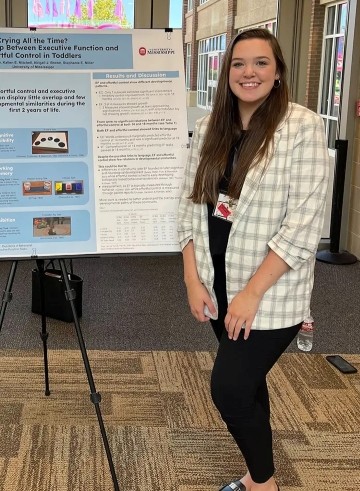
Get Involved!
"The field of psychology is incredibly broad and there are dozens of ways to use your major. I would recommend talking to professors who research different topics and ask questions so you can begin to explore what your interests are. I also recommend getting involved and having first-hand experience with the topics you are passionate about. The psychology department has a number of opportunities for you to get involved such as research labs and internship classes. By doing this, you can begin to see what path suits you."
Racheal Embry ('24)
Pursuing a Masters in Counselor Education with an emphasis in Clinical Mental Health Counseling at UM
Beyond the Classroom
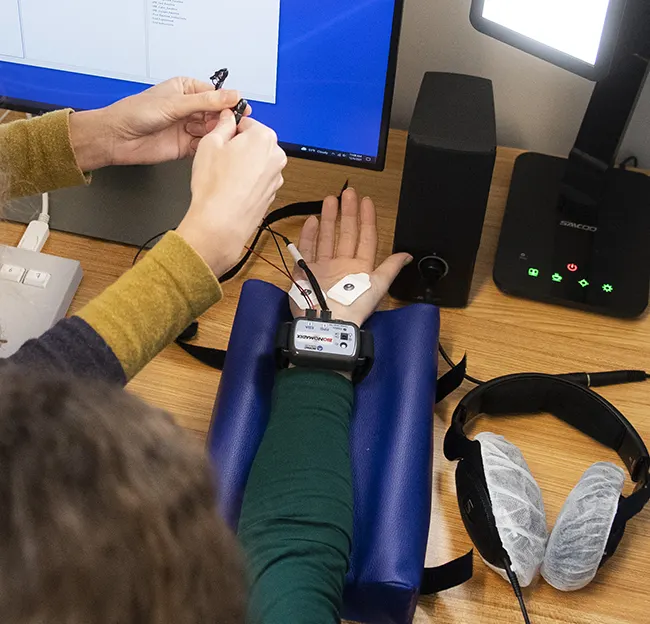
Research Assistantships
Students are encouraged to earn credit for their psychology major while learning research methods and working in labs on exciting research projects with your professors. Find out from your psychology professors what research opportunities are currently available.

Internships
Apply psychology knowledge and skills in approved internship settings while building professional skills and a career network. Earn credit through Psy 401 internship course.
For example, a student interned in Atlanta at Synapse, a patient care facility that focuses on neuroplasticity, the field of helping the brain heal itself. Another student interned at the local North Mississippi Regional Center for people with intellectual and developmental disabilities. She performed behavioral analysis and created daily goals for residents alongside her mentor.

Travel Courses
Consider taking a travel course to fulfill courses in the general education, major, minor, or electives. One option includes faculty-led travel courses, which are supported by College of Liberal Arts scholarships.
For psychology, Dr. Laura Johnson taught Environmental Psychology in Tanzania where students get involved in international conservation research and community participation. Dr. Carrie Smith takes students to Belfast, Dublin, and London to study the Psychology of Terrorism and Extremism in Ireland.

Psychology Club
The Psychology Club is a student led organization, open to any students, whose mission is to inform its members of the opportunities in the psychology department as well as host social events through monthly meetings. We also host psychology research presentation days.

Psi Chi Honors Society
Psi Chi, the National Psychology Honor Society, recognizes academic excellence in psychology. Students must apply and are accepted based on their academic record. The UM chapter meets monthly, offering graduate school preparation and connections to local resources, including volunteer opportunities, research activities, and departmental events.
